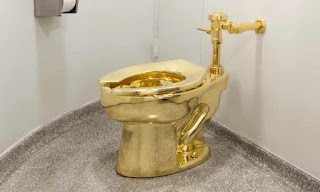Food, Clothing & Shelter? What About the ‘Call of Nature’?
The poem Death the Leveller (below) by the English dramatist, James Shirley (1596-1666), is one of the legacies of our Colonial education in British West Africa.
THE glories of our blood and state
Are shadows, not substantial things;
There is no armour against Fate;
Death lays his icy hand on kings:
Sceptre and Crown
Must tumble down,
And in the dust be equal made
With the poor crookèd scythe and spade.
The great dramatist may be right about ‘death’ being a ‘leveller’.
However, may I humbly suggest that before the final call, there is another call: a daily human activity which is the true leveller: answering the ‘call of nature’!
The 'call of nature' is, incidentally, one of those polite phrases we usually prefer to use when we want to avoid using certain words. In this case, the phrase we have chosen to describe our response to necessary human bodily functions.
Words and Phrases We Choose to Avoid
Perhaps, there’s no other word in English (or any other language?) which has more slang or avoidance words than that for the human bodily waste which results from the food we eat!
There are the English and the Irish who talk of doing a ‘number one’ (front action) or ‘number two’ (back action) to refer to the two kinds of ‘easing oneself’.
Sometimes, we might even discover to our utter embarrassment, or even horror, that an innocently chosen nickname (or an actual name given at birth) in one language turns out to be something else, and totally unexpected in another language! Poor Kaká (real name Ricardo Izecson dos Santos Leit) - brilliant Brazilian footballer, former FIFA World Footballer of the Year and with a price tag (in 2009) of £100 million sterling.
Sadly, ‘kaka’ is also what, one is reliably informed, is the French slang for human waste (of the ‘number two’ kind)! An expensive piece of sh*t, some mischievous French person might say?
A ‘kaka’ player in France is not exactly, well, a candidate for Footballer of the Year, at world or village level, is he?

Here’s Belgium’s Menneken Pis (right) doing a ‘number one’.At this point, I am sure some readers are thinking this entire effort is just a load of sh*t?
Quite right! And that's exactly the point - putting sh*t at the top of the health agenda.
But, why not? Why not a discussion on toilets?
Let’s just pause and think about this for a moment: what is one of the most pressing, indeed unavoidable, of the human body’s involuntary responses one can think of?
 Yes, you got the right answer spot on; I have, therefore, absolutely no apologies to make for raising this important issue.
Yes, you got the right answer spot on; I have, therefore, absolutely no apologies to make for raising this important issue.
The only personal experience we all share, regardless of our nationality, gender, family, social or economic background, rich or poor, is the ‘toilet experience’.
This ‘toilet experience’ is also something none of us can ever avoid, as long as we choose to continue to eat or drink.
It is not voluntary, but a ‘forced’ response to the human body’s demand; has anyone made the futile attempt of trying to hold back when one desperately ‘needs to go’?
One can hardly imagine the subject of toilets being the topic of polite conversation in VIP circles. At the same time, there’s no doubt the location of the toilet would be one of the first places a VIP guest might enquire (or be notified of) on arrival at an event.
We also seem to have this particularly uncomfortable habit of avoiding a discussion on the human body’s response to our food and drink consumption, and therefore end up neglecting to address the ‘toilet problem’ (in some countries, in any case).
So, why do we have what could be described as a totally unreasonable attitude towards such a vital transformation by our bodies of the food and drink we consume, and the failure to provide the facility to handle what results from this change of state of that food and drink? It certainly is this strange, careless and neglectful approach to something which comes out of our own bodies that anyone must find baffling; not to mention the serious risk to health.
Pyramid of Human Needs
Most of us are, probably, also aware of the generally accepted notion that human basic needs are: Food, Clothing (to keep warm, in contrast to the fashion context) and Shelter, in that order.
The same food one has taken into the body turns into something else one doesn’t even want to touch now or stay within a certain distance of.
Presumably, whoever first came up with that list forgot a most important element in the equation: the need to properly get rid of what becomes of the food we put into our bodies?
Should we, therefore, not think of the best way to deal with this problem?
This is where toilets come in.
It could be argued that one can do without clothing, especially in a warm environment, though one would also need to be brave enough and psychologically prepared to go around naked!
In the same respect, the need for shelter is, arguably, not quite as crucial as to be placed on the ladder of human needs.
Let’s put it this way: if you live in the tropical regions of the world, keeping warm will not be an urgent issue; the trees would also provide welcome shelter from the sun on hot days?
Food, toilets, clothing and shelter, in that order of importance, would therefore be a more appropriate ranking order on the human needs ladder?
Human Life in ‘Toilet Years’
Apparently, the average 70 year old person would have spent the equivalent of three and a half years of this lifetime attending to ‘toilet duties’! An incredible statistic!
Yet, we do not seem to give toilet duties the necessary attention it deserves and, hence, to provide the facilities (like the one on the right, perhaps,) to make the experience, well, less stressful. Indeed, one could argue, the properly planned and designed toilet is the only place where three and a half years of absolute privacy and time for personal reflection can be found?
Toilets (sorry, ‘Call of Nature’) as a Metaphor for ‘Forward Planning’
Toilets can also be a metaphor for ‘forward planning’ - thinking of what will happen to the food one is going to put into one’s body, and how one can properly dispose of what that food turns into a few hours later.
After all, it has been said that the measure of any civilisation can be judged more from the quality of its toilets or how that society disposes of its human bodily waste.
The ancient Romans were also reputed to have taken the quality of their toilets very seriously, ... and quite rightly so!
Closer to our own times (in historical terms), the Tokyo Toilet is something which has been taken to a different level as an art form.“Toilets are a symbol of Japan's world-renowned hospitality culture. Public toilets will be redesigned in 17 locations throughout Shibuya with the help of 16 creators invited from around the world. We invite you to take a look at the uniqueness of each of these facilities.”
The Great Leveller
Has anyone ever wondered whether those we are supposed to be in awe, or even afraid, of that one can think of, ever answer the ‘call of nature’, or attends to toilet duties, as ordinary folks do?
Indeed, what about all those who wield their power over us mere mortals?
Dear friends, rest assured; all these ‘powerful’ folks have to succumb to the one thing which brings all of us - the powerful and the not-so-powerful, the rich and the not-so-rich, the young and the old - to the same level: the need to answer a call none of us can ever ignore.
Ex-colonial masters also have to respond to the same life’s requests, nay, demands, as the colonised; they have not been excused from performing that particular duty.
Addressing the Problem
The United Nations declared 2008 International Year of Sanitation (indeed, the UN should have proposed a Decade of Sanitation).
Having said farewell to 2008, and long before the SDGs, perhaps we could have focused attention on the most important human daily activity (after breathing and eating)?Here is an idea worth considering: can citizens of any country with inadequate toilets ask their aspiring politicians and candidates for public office: President, Parliament and, indeed, local Authority, what realistic plans they have to solve sanitation (and specifically, toilet) problem?
This will sort out the serious politicians from what we could call the ‘jokers’.
The UN’s International Year of Sanitation should also have been a wake-up call by all those countries where this fundamental human need is neglected, and a chance to set up a serious on-going programme to address this shortcoming.
Enter the SDGs
It is for this reason that particular attention be paid to SDG 6.2; in countries where the problem is to do with ‘invisible’ public toilets (too many of us face the “these toilets are for customer use only” sign, whether politely expressed or not!) this should also be put right.
PUBLIC TOILETS: AN ESSENTIAL BUT UNDER-APPRECIATED AMENITY
We urgently need to get directly to the bottom of this toilet problem! Pun very much intended here!
Sorry, I have to go; nature calls, and it is a ‘call’ I definitely can’t ignore. Oh, please, don’t ask me if it is a ‘number one’ or ‘number two’; this is strictly a private matter!
But, don’t worry, I might - indeed, I know - I’ll be back to talk some more sh*t before long.









